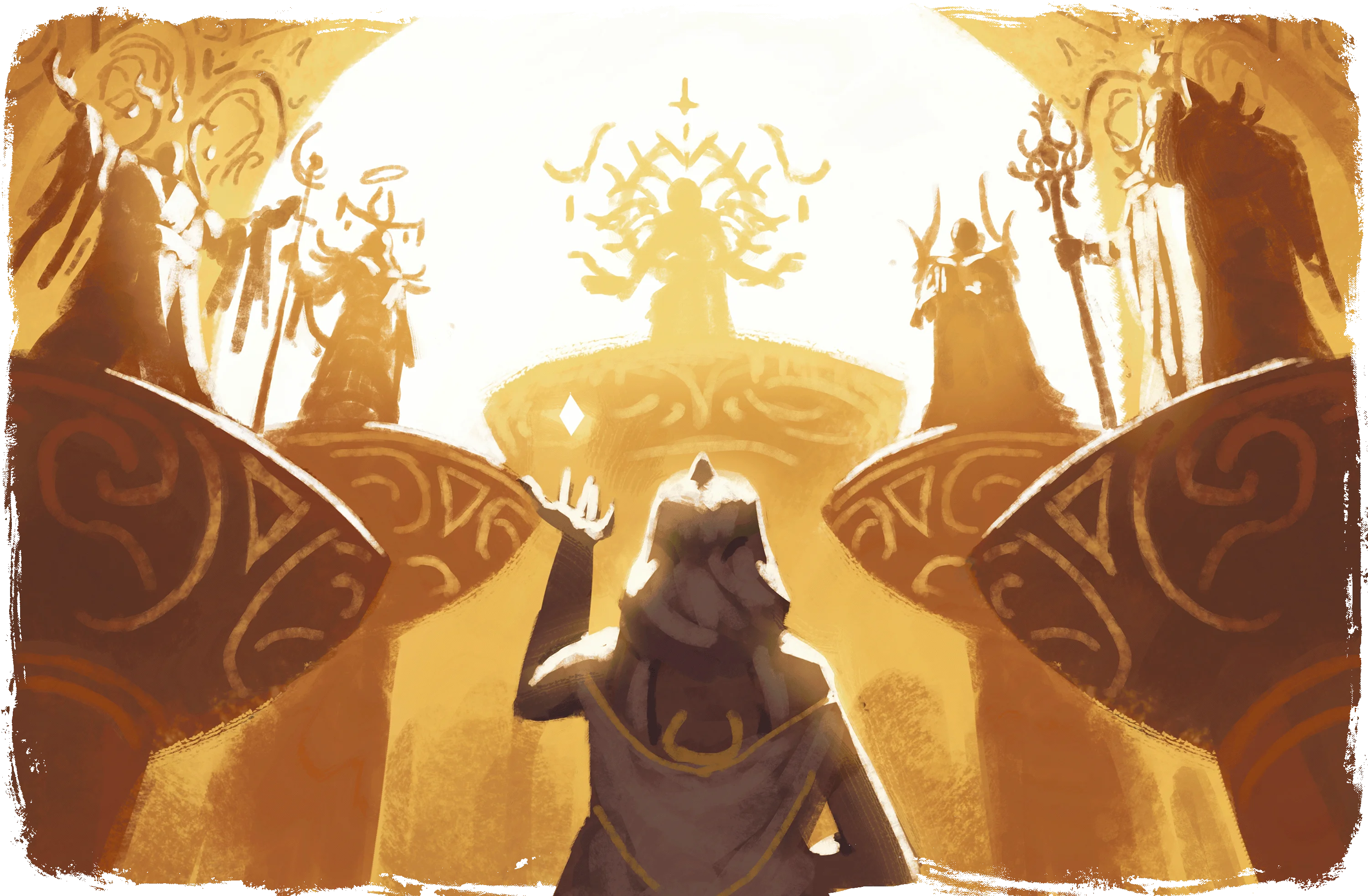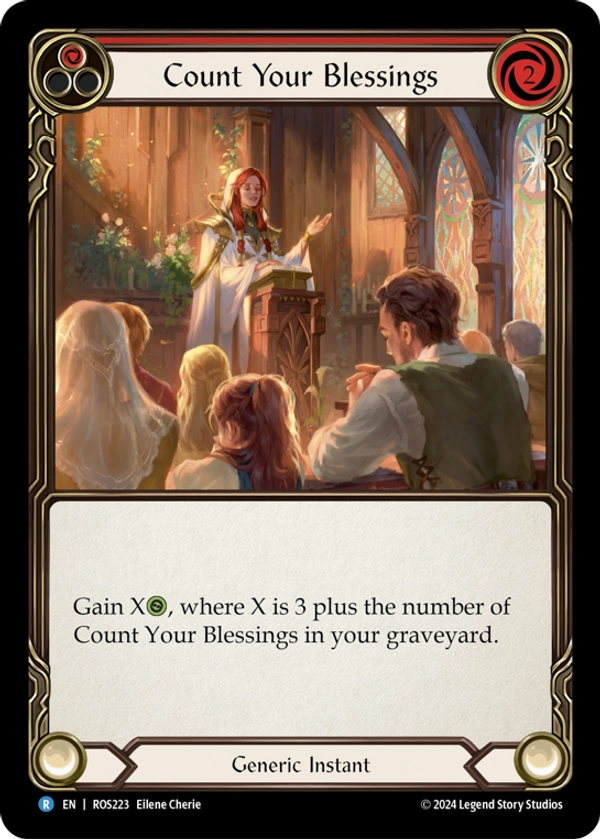The court calls case ROS-223, Count Your Blessings v FAB Community, the Honourable Judge Theryon presiding.

From the moment Count Your Blessings was revealed, its presence in Flesh and Blood has been met with concern and skepticism. A cumulative life gain card whose value isn't truly seen until the second half of the game, Count Your Blessings broke new ground for deckbuilding, expanding the options to express a fatigue plan and granting this theoretical capability to all.

Counting the Cost
The math on Count Your Blessings is only on-rate if you make it to your 9th copy. If we treat life gained and damage dealt as equal - which, admittedly, is an oversimplification - playing all 9 has 54 value, or 6 per card; at a cost of 2, that's Brutal Assault. Conversely, if you manage to get early copies into the discard without playing them (no easy feat, as they're Instants without block values), the rate improves marginally - but your overall life gain decreases. On paper, it would seem CYB is within the range of standard design, perhaps not even notable.
Compare it to that Brutal Assault (red). Let's say every copy of CYB in a decklist was instead Brutal Assault (red); how would that game play out differently? Well for one, the opponent could block it; that may not be a better deal for an aggro deck like Aurora or Dash, but it certainly would be for a more value-oriented deck like Dorinthea or Riptide, a deck that comes to the table intending to block, that may not be able to use a full hand on the offensive anyway. Additionally, Brutal Assault isn't playable alongside another card without one of the two of them having go again; as an Instant, Count Your Blessings can be. In fact, as an Instant, CYB can be played during the opponent's turn, which can pair in relevant ways with defensive plays costing 1 resource. The main advantage of Brutal Assault is that it gets you closer to winning, while CYB merely moves you further from losing.


So what if Count Your Blessings was Guardian of the Shadowrealm instead? That's as close as could be found for a blank 2-for-6 defense reaction. In that case, the value of Guardian of the Shadowrealm would depend on if it could find 6 damage to block. Count Your Blessings, of course, gains the 6* life no matter what; a block may lose points as it covers more than the attack actually did. The one advantage to the defense reaction is its ability to stuff an on-hit effect, which is going to be matchup-dependent.
In summary,
Brutal Assault: -6 Opponent's life total, can be mitigated by opponent
Guardian of the Shadowrealm: -6 Opponent's attack, can be made inefficient by lower attack values
Count Your Blessings: +6 Your life total
In both instances, you can see how Count Your Blessings' value across the whole game is much more flexible, held in check primarily by the odds that you never realize the full value. Again, CYB has an average value of 6, and you only get there if you make it to the late game. (In a best-case scenario where you play all 9 and the reds come up first, your CYB plays would gain 3,4,5,5,6,7,7,8,9 life, respectively.) Each play costs you 2 cards from hand (the CYB and the pitched card) while reducing your deck by 1 (relevant only if you hit fatigue).
Blessings Only Go So Far
But there's a catch: the value of life gain only exists if that life ends up being relevant. The win condition of Flesh and Blood is "opponent to 0", not "greater health total at the end". As such, Count Your Blessings could arguably be said to have no value unless 2 circumstances are fulfilled:
1. You bring your opponent to 0 within the allotted time limit, and
2. Your life total at the end of the game would have been below 1 if not for the life gain.
It may feel like a decisive victory to end at 55 life, but that literally means every one of your CYBs did nothing to forward your gameplan. And if you can't bring your opponent to 0 in 50 minutes, that match is a draw; it doesn't matter if you were up.
Count Your Blessings... has no value unless 2 circumstances are fulfilled:
1. You bring your opponent to 0 within the allotted time limit, and
2. Your life total at the end of the game would have been below 1 if not for the life gain.
This, I believe, is a critical distinction that many players are overlooking. The mantras are widespread - "life is a resource", "1 is not 0", etc. - but the messages aren't always internalized. Any game that you won with life remaining means somewhere along the line you could have held that card instead of blocking with it and ended things that much faster. Count Your Blessings takes this to its extreme conclusion: life gain, no matter how great, is not a win condition.
Why Do We Count Our Blessings?
So if life gain doesn't progress your win condition, what does it do? Obviously, it delays your loss condition. But in doing so, it's buying you time - and what you do with that extra time is actually what this whole thing is about.
Count Your Blessings can be used to extend the game long enough to find your combo. It can be used to move into a later phase of the game, where your hero may be more advantaged than the enemy. And, as is the case for Enigma, it can simply be used to continue expressing the value advantage inherent to your card pool.
Buying time is a dangerous way to play the game - but sometimes, it's the right play. Ask any aggro player who pivots to a pitch stacking strategy, or a combo player who resorts to blocking out while they dig for their essential puzzle pieces. Count Your Blessings is no different. It's a dangerous way to play because it gives your opponent time to do their thing, and because by itself it does nothing to further your win condition.

Much has been made of Count Your Blessings in Enigma, who won the World Championship this past weekend piloted by Grzegorz Kowalski. It was a well-chosen deck into the meta, and Kowalski played it to perfection. Many have taken issue with the way in which the deck won - primarily by fatigue, in the matches we saw on stream - and placed the blame at the feet of CYB. But if we apply the lens above to the scenario at hand, CYB's role in the deck was to buy time; the part of the deck that actually served as the win condition - slow, inevitable fatigue and across-the-game value - was all Enigma.
This becomes all the more apparent as you look at the variety found in Count Your Blessings lists. Take, for example, Michael Hamilton's CYB Nuu. Again, we can point to Count Your Blessings as a tool to keep the hero alive; but in this case, Nuu's goal is to get rid of your best cards and move the game rapidly to the part where Nuu's cards are better then the opponent's. This is proactive fatigue, as well as late-game value - a very different plan than Enigma's even if we use some of the same words to describe them. We may see a rise in CYB Nuu as a result of Hamilton's choice to play it at Worlds, but by and large the Nuu community has viewed this option with mixed opinions.
Perhaps the first hero to jump on the CYB bandwagon was Verdance, as shown by Luke Magnuson at Battle Hardened: Milwaukee. Verdance uses Count Your Blessings both to survive to her combo and as part of her combo. The drastic decline in Verdance's meta prevalence suggests that Count Your Blessings, in this instance, is just okay; Rampant Growth remains a tenet of the hero, but Count Your Blessings is optional, and leaves significant vulnerabilities that must be accounted for.
These decks are united by their use of Count Your Blessings as a tool to reliably see the late game, but for different purposes. In many ways, that's no different than how 0-for-4s are staple tools of aggro decks, or 0-for-4 defense reactions are staples in... well, everything. So if Count Your Blessings seems to be in every deck you hate, perhaps we need to talk about those decks instead...
The Role of Late-Game Decks
Late-game decks are the strategic opposite of aggro decks, which are trying to end the game as quickly as possible. When an aggro deck is successfully executing its plan, the enemy doesn't have enough turns to achieve its own win condition; conversely, when a late-game deck is successfully executing its plan, the opponent has too many turns and tires out. When you get beaten by an aggro deck, it's over fast. When you get beaten by a late-game deck, you're there for a while. But ultimately, both are using the length of the game against you, and attempting to find the outer limits of your deck's construction. Can you pivot to a defensive posture and outlast my attacks? Can you go on the offensive and overwhelm me?
Now try to imagine we don't have late-game decks. You wouldn't have to consider your 'damage per cycle', and could pack all the defensive tools you wanted to stand against the aggressive threats... which would lead to the rise of the late-game archetype we just wiped out. Which is to say, it's inevitable that these types of decks exist. There will always be decks trying to make the game go long; someone will always be asking you to overcome their defenses.
We need to give more credit to long-game strategies. We need to accept that defensive decks - from Enigma to Victor to Kassai - have a fundamental right to exist, and we need to build our own decks as if we will encounter them. The efficiency that drives the very best aggro decks may push you to stick to a flat cost curve of 0, but decks need to have endurance too. We can't hyper-fixate on one end of the spectrum and get upset whenever we're forced to face our own negligence.
As in all things, it comes down to balance. There's 'aggro' and then there's 'too aggro'; there's 'defensive' and then there's 'too defensive'. The tipping point is a matter of debate, but we have seen it, and LSS has responded to it. Perhaps Count Your Blessings approaches that tipping point, but personally I'm inclined to think not. After all, we've hardly begun trying to counter it. Token copies of Poison the Well are about as reliable as packing 3 Oasis Respites and calling that a Kano plan: which is to say, you can't counter one card and call that an archetype plan.


Losing Count
The success of Count Your Blessings Enigma goes well beyond that life gain - without CYB, Enigma will still present us with the challenge of overcoming her defenses. If you struggle with Enigma now, you will continue to struggle. But if we don't search for answers within the existing card pool and instead rely on a ban to solve our problem, we'll only repeat this same situation the next time late-game decks get a new tool. Yes, there is a tipping point; there are outer bounds. But we've hardly put CYB through the stress tests to confidently say we've gone too far yet.
Without CYB, Enigma will still present us with the challenge of overcoming her defenses. If you struggle with Enigma now, you will continue to struggle.
So what am I suggesting?
First, when you're playing against a Count Your Blessings deck, ignore the life total and think about what the rest of their deck is doing. The goal is not to be ahead in the end; the goal is to bring the opponent to zero before time runs out. If you prevent them from doing that, they've failed. That's not a suggestion that you burn the clock and slow-play; it's a reminder that your in-game posture is a choice, and if you go on the defensive you may find that they've neglected actually dealing damage in their build. If time is called and you're down by 20 but still very much alive, don't concede out of a sense of sportsmanship, then grumble that they played life gain; you gave them a victory they didn't earn! Call a draw a draw!
Second, think about teching for the matchup - not just for CYB. That means getting more value out of pitching. That means cutting into their late-game options. Think about how they're getting value, and look for ways to disrupt that. (Not every deck will have these options, but the generic card pool offers tools that can at least give you access to important effects, even if they lack synergy with your core gameplan.)
Third - and I realize this is a privileged position to be in, but Talishar exists - try playing these decks yourself. So often, what your opponent is doing with a deck you don't play feels like magic. But when you pick up the deck yourself, the complexities reveal themselves, and you can appreciate how what they were doing wasn't at all effortless, how often the whole thing nearly broke. You might even find that you enjoy the deck a lot more than you thought you would.
Finally, I implore you to think about your favorite meme deck, your janky combo that never worked, and think about if CYB could buy you the time to actually execute that concept. Maybe you want to get Arakni, Huntsman to work just as they are, without the enhancements we're expecting for them in The Hunted. Maybe you've got a failed Axe Olympia deck that's never had the time to play 3 copies of Visit the Golden Anvil. Is it Teklovossen time?
In the end, LSS may determine that Count Your Blessings is too much, or simply that it's not a play pattern they want to support. They may also decide it's the shot-in-the-arm that late-game decks universally needed, and we'll all be forced to adapt. Either way, the decks that might take to CYB now will continue to exist, and we need to collectively acknowledge them to a much greater degree than our current meta does.




